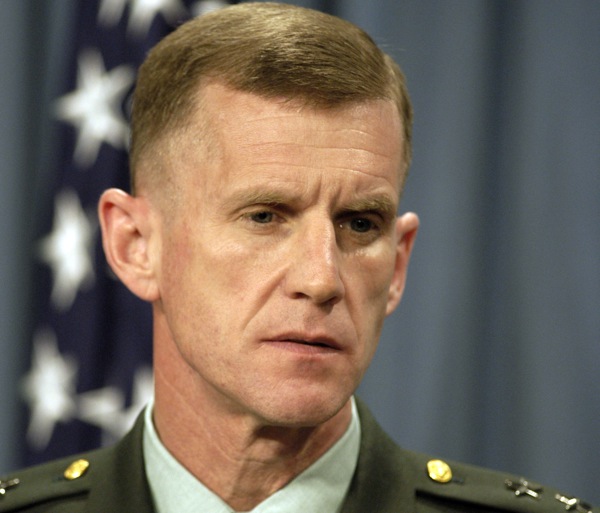Media Pushes ‘Rift’ Between McChrystal and Obama
In a London address on Thursday, Gen. Stanley McChrystal, the commander of U.S. and NATO forces in Afghanistan, repeatedly defended President Obama’s review of Afghan strategy, though coverage claimed he broke from the White House.
Jul 31, 2020103.1K Shares2.2M Views
Army Lt. Gen. Stanely McChrystal (defenselink.mil)
In a London address on Thursday, Gen. Stanley McChrystal, the commander of U.S. and NATO forces in Afghanistan, repeatedly defended President Obama’s review of Afghan strategy; encouraged open debate on the controversial question of what to do about the bleak-looking war; recapitulated his argument that a counterinsurgency approach holds the best chance of success; and declined to answer any questions about increasing troop levels before Obama reaches a decision. Yet since then, McChrystal has been portrayed in the press as disloyal to Obama for saying anything at all, and all sides are trying to put an end to the controversy.
The New York Times portrayedMcChrystal’s brief defense of the virtues of stabilizing Afghanistan as a public rebuke of Vice President Biden, who contends that restricting the mission to hunting terrorists and emphasizing Pakistan is the wiser course of action. In an op-ed in The Washington Post on Saturday, Yale law professor Bruce Ackerman saidMcChrystal had “no business making such public pronouncements” and was in “plain violation of the principle of civilian control” of the military. On CNN Sunday, ret. Gen. Jim Jones, Obama’s national security adviser, curtly repliedthat “better for military advice to come up through the chain of command**” **than in public pronouncements. Speaking Monday morning to the U.S. Army’s annual conference in Washington, Defense Secretary Robert Gates said, “It is imperative that all of us taking part in these deliberations – civilian and military alike – provide our best advice to the president candidly but privately.”
Illustration by: Matt Mahurin
Shortly after Gates’ remarks, a spokesman for McChrystal, Air Force Lt. Col. Tadd Sholtis, signaled that McChrystal wished to end the controversy. “General McChrystal concurs with the secretary and shares his perspective that the president’s military and civilian policy advisers need to provide candid but private advice,” Sholtis toldTWI. Sholtis added that McChrystal does not have any additional public appearances planned.
Sources close to McChrystal have privately expressed concern that the general’s remarks have been misinterpreted as insubordinate. Both the Bush and Obama administrations have lamented that many European allies have wavered in their support for the Afghanistan war, and so, far from engaging in what the Washington Post called a “public campaign” to influence Obama through the press, McChrystal has sought to address the concerns of skeptical troop-contributing publics since taking command in June. In London, speaking to the International Institute of Strategic Studies, McChrystal said, “I think the more deliberations we have, the more debate we have, the healthier this is gonna be.”
McChrystal’s London remarks, delivered at the U.K.’s premiere security think tank, the Institute for International and Strategic Studies, may have been delivered the day after Obama’s war cabinet met to debate Afghanistan, but they were the result of weeks’ worth of planning. “The IISS invited General McChrystal to address the Institute, having learnt of his intention to travel to the UK,” said Adam Ward, the director of the Institute’s studies, who added that the institute’s invitation had been extended “some weeks before he came.” Ward added that McChrystal appeared “very careful to appear not to be overstepping any boundaries,” noting that the general, far from rebuking the adminsitration, repeatedly declined to answer questions about troop levels ahead of Obama’s decision.
“From our perspective, we just wanted to hear him set out his thinking on Afghanistan,” Ward said.
Far from breaking with Obama, McChrystal, in his talk to the IISS, defended the Obama strategy review repeatedly. “People are re-looking what our goals and objectives are and redefining and clarifying those, and I think that’s helpful,” the general said. His only remark that addressed a question up for debate in the strategy review was a contention that “a strategy that does not leave Afghanistan in a stable position is probably a short-sighted strategy,” something the Times reported as a shot at Biden. (Despite reports that McChrystal called Biden’s plan “Chaos-istan,” the full context for what McChrystal saidwas “A paper has been written that recommends that we use a plan called ‘Chaosistan,’ and that we let Afghanistan become a Somalia-like haven of chaos that we simply manage from outside,” an option he indeed rejected.) But for the better part of half an hour, McChrystal dodged questions on a prospective troop increase, and portrayed the strategy debate, rather than the troop request, the more urgent consideration, saying, “I don’t think we have the luxury of going so fast [on debating strategy that] we make the wrong decision,” a remark that, if anything, inverted an argument made by Obama’s domestic critics.
Nor were those remarks unique. In mid-September, after he completed his assessment of war strategy to the Pentagon in late August, McChrystal spoke to reportersat the Dutch Defense Ministry, where he likened his role to a “Clingendael — also at its invitation — where he gave what Sholtis described as essentially the same speech he provided to the IISS.
Officials throughout the Obama administration, military and civilian, deny any rift and contend that the controversy over McChrystal’s remarks is a media-driven event with little substance. Some noted that Defense Secretary Robert Gates, who has set himself up as a key swing vote in the debate over changing Afghanistan strategy, has zealously guarded the administration’s freedom of action, and reacted very badly to the leak of McChrystal’s assessment — which did not, several civilian and military officials confirm, come from McChrystal’s staff. “The impact may be the opposite of the leaker’s intent,” said an official in the Office of the Secretary of Defense. “This will increase the determination of the civilian leadership not to be rushed or pressured.”
In the past, Gates has not hesitated to rebuke or fire officials he has found lacking. Unlike predecessor Donald Rumsfeld, who allowed two wars to deteriorate and only fired the leadership of the Army for defending a scrapped artillery system and saying the occupation of Iraq would require hundreds of thousands of ground troops, Gates fired McChrystal’s predecessor, Gen. David McKiernan, over a perception that McKiernan was an insufficiently aggressive and innovative commander; and acquiesced in the departure last year of Adm. William Fallon, the commander of U.S. forces in the Middle East and South Asia,for criticizing the Bush administration’s Iran policies in a magazine interview.
Gates’ willingness to fire senior leaders has been cited by uniformed personnel to play down media speculation over a civilian-military split. At the Army conference Monday, Gates attempted to preemptany such division, or a similar media narrative interfering with Obama’s decisionmaking, telling the hundreds of officers in attendance, “Speaking for the Department of Defense, once the commander-in-chief makes his decisions, we will salute and execute those decisions faithfully and to the best of our ability.” The defense secretary is scheduled to meet with President Obama Monday afternoon for a private talk.

Paula M. Graham
Reviewer
Latest Articles
Popular Articles

